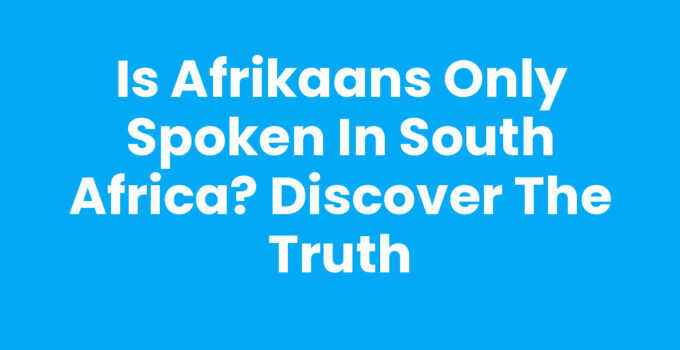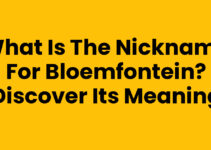Afrikaans is one of South Africa’s prominent languages, known for its unique characteristics and historical significance. Many people wonder whether this language is exclusive to South Africa or if it finds speakers elsewhere. In this article, we will explore Afrikaans in detail, examining its origins, current distribution, and cultural significance.
Is Afrikaans Only Spoken in South Africa?
The short answer is no; while Afrikaans is predominantly spoken in South Africa, it is not limited to this country. Afrikaans is one of the 11 official languages of South Africa, used widely across different regions. As a West Germanic language, it evolved from Dutch and has a rich history that connects to both the indigenous peoples and European colonizers.
Afrikaans is also spoken in Namibia, where it serves as a common lingua franca among various ethnic groups. In addition, there are small communities of Afrikaans speakers in other countries such as Australia, the United Kingdom, and the United States. These expatriate communities maintain the language as part of their cultural identity, fostering its use in family and social settings.
Over the years, Afrikaans has also gained recognition in various spheres globally, particularly through literature, music, and media. With numerous Afrikaans-speaking artists, authors, and musicians gaining popularity outside South Africa, the language continues to capture the interest of new audiences.
You Might Also Like: Explore Busamed Bloemfontein Private Hospital: Your Healthcare Destination
Understanding the Roots and Evolution of Afrikaans
To grasp the reality of Afrikaans beyond South Africa, we must delve into its historical development. Afrikaans originated from the Dutch language brought by settlers in the 17th century. It began as a simplified version of Dutch influenced by various indigenous languages, as well as Malay, Portuguese, and the languages of the Khoisan peoples.
Throughout the years, Afrikaans became a distinct language with its own grammar, vocabulary, and pronunciation. By the late 19th century, it was recognized as a separate language, leading to the establishment of Afrikaans literature and the formation of schools teaching in Afrikaans. Its rich literary tradition has produced several renowned writers, further solidifying its status.
In contemporary times, Afrikaans speakers promote the language through various cultural events, such as Afrikaans music festivals and literature awards, keeping it vibrant and relevant. This cultural engagement is an essential factor in the language’s survival and growth both in South Africa and abroad.
The Cultural Significance of Afrikaans
Afrikaans holds a significant place in the cultural identity of many people. For countless South Africans, it is not just a means of communication but a reflection of their history and heritage. It acts as a connecting thread for various communities and ethnic groups.
Beyond just being a language, Afrikaans embodies the stories, struggles, and triumphs of its speakers. Cultural expressions through prose, visual arts, and even culinary practices continue to enrich the texture of Afrikaans-speaking communities. Notably, music in Afrikaans has seen a resurgence, gaining new audiences and showcasing the language’s adaptability to modern themes and styles.
The language also faces contemporary challenges, especially in South Africa, where it is often associated with the apartheid era. Initiatives continue to evolve that balance the preservation of Afrikaans with the need for inclusivity and mutual respect among different language communities.
Recommended Reading: Explore Historical Buildings in Bloemfontein: A Guide
Conclusion
In summary, while Afrikaans is primarily spoken in South Africa, its speakers can be found in Namibia and various expatriate communities around the globe. The language has a rich history and cultural relevance that extends beyond mere geography. As we embrace globalization, the importance of understanding and preserving languages like Afrikaans grows stronger, highlighting the interconnectedness of cultures worldwide.
See Also: Discovering Charles Street, Bloemfontein: A Local’s Guide
Frequently Asked Questions
Is Afrikaans only spoken in South Africa?
No, Afrikaans is also spoken in Namibia and by communities in countries like Australia and the USA.
What are the origins of the Afrikaans language?
Afrikaans originated from Dutch brought by settlers in the 17th century, influenced by various indigenous languages.
How is Afrikaans culturally significant?
Afrikaans reflects the history and heritage of its speakers, impacting literature, music, and the arts within and outside South Africa.



